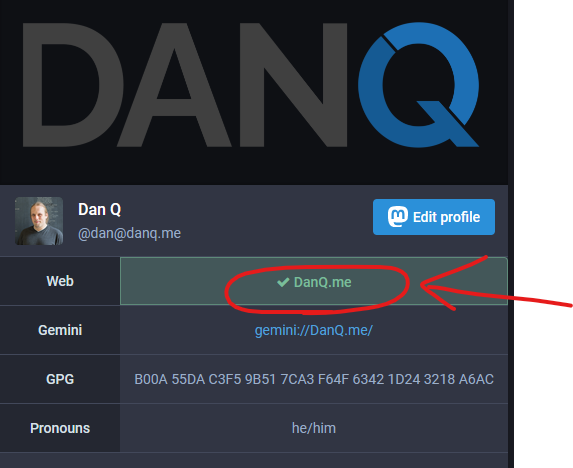Let’s not sell Mastodon short here. The service you compare it to – Twitter – solves this problem… but only if you trust Twitter as an authority on the identity of people. Mastodon also solves the problem, but it puts the trust in a different place: domain names and account pages.
If you want to “verify” yourself on Mastodon, you can use a rel=”me” link from a page or domain you control. It looks like this:

A great thing about this form of verification is you don’t have to trust my server (and you probably shouldn’t): you can check it for yourself to ensure that the listed website really does state that this is the official Mastodon account of “me”.
You can argue this just moves the problem further down the road – instead of trusting a corporation that have shown that they’re not above selling the rights to your identity you have to trust that a website is legitimate – and you’d be right. But in my case for example you can use years of history, archive.org, cross-links etc. to verify that the domain is “me”, and from that you can confirm the legitimacy of my Mastodon account. Anybody who can spoof multiple decades of my history and maintain that lie for a decade of indepdendent web archiving probably deserves to be able to pretend to be me!
There are lots of other distributed methods too: web-of-trust systems, signed keys, even SSL certificates would be a potential solution. Looking again at my profile, you’ll see that I list the fingerprint of my GPG key, which you can compare to ones in public directories (which are co-signed by other people). This way you’d know that if you sent an encrypted DM to my Mastodon inbox it could only be decrypted if I were legitimately me. Or I could post a message signed with that key to prove my identity, insofar as my web-of-trust meets your satisfaction.
If gov.uk’s page about 10 Downing Street had profile pages for cabinet members with rel=”me” links to their social profiles I’d be more-likely to trust the legitimacy of those social profiles than I would if they had a centralised verification such as a Twitter “blue tick”.
Fediverse identify verification isn’t as hard a problem to solve as Derek implies, and indeed it’s already partially-solved. Not having a single point of authority is less convenient, sure, but it also protects you from some of the more-insidious identity problems that systems like Twitter’s have.
Hi Dan,
Thanks for the thoughtful response!
I didn’t know about this, I’ll add it it to my Mastodon profile!
I think this solution works for the tech savvy, but it’s trickier for the less geeky among us. As far as I can tell many of the verified people I follow on Twitter don’t have their own domains, and this might add a lot of overhead for journalists, academics, civil society types.
It’s an educational process, but my gut instinct is that the average non-tech person would feel safer texting a signal number listed in a (pre-Musk) verified on Twitter journalist’s bio. At least for now.
It will be interesting to see how this space evolves though; I’ll certainly be happy to see Mastodon replace Twitter.